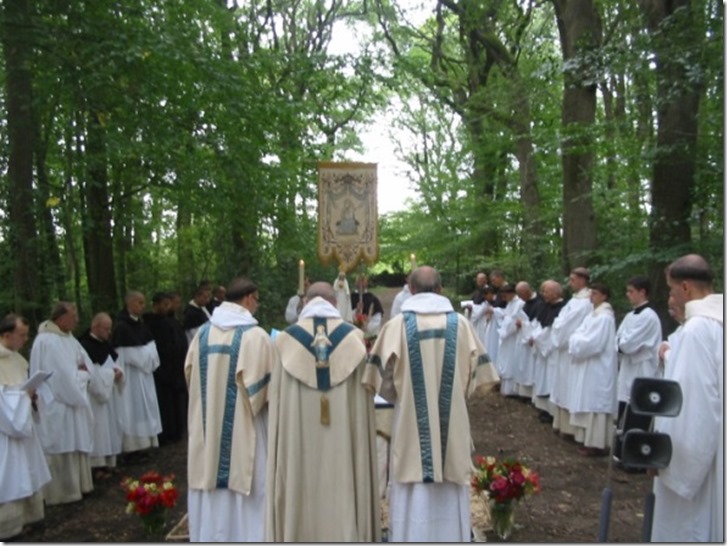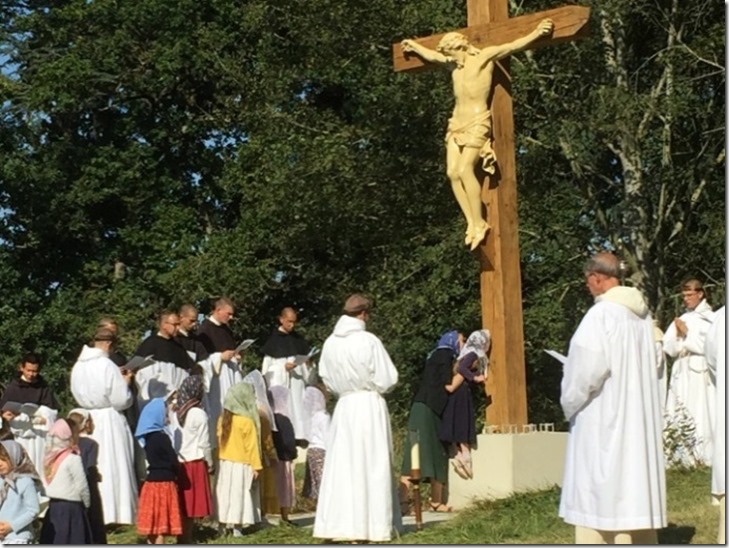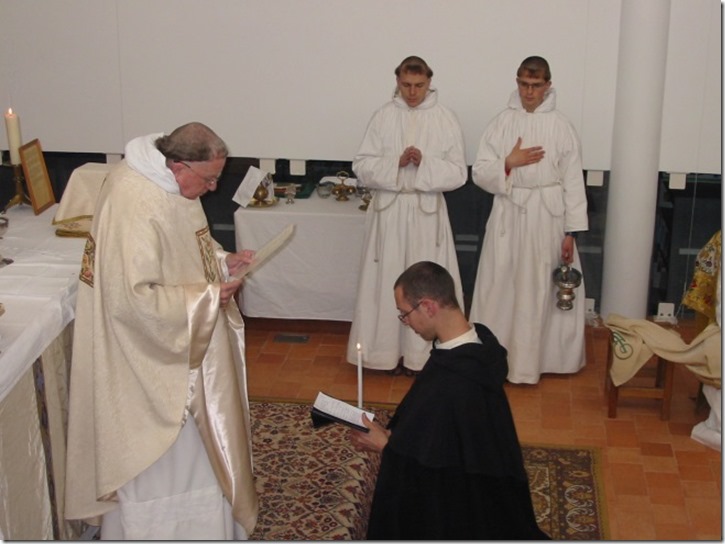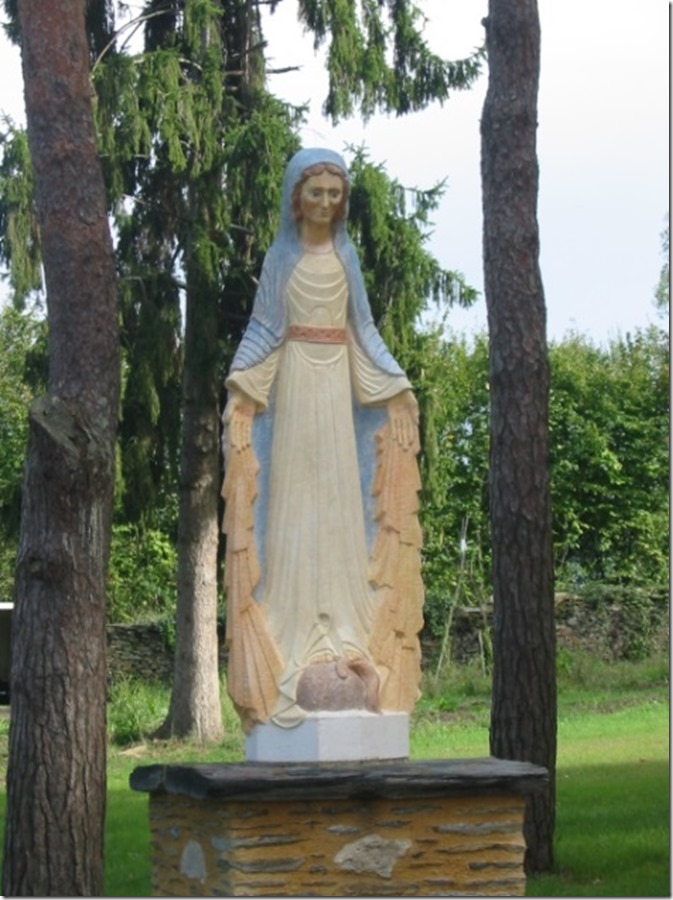Small Catechism on the Spiritual Life
by Fr. Gabriel of St. Mary Magdalen O.C.D.
(text in French published by Le Sel de la terre)
Fr. Gabriel of St. Mary Magdalen O.C.D (1890-1953) was a consultant for the Congregation of Rites and professor of Spiritual Theology at the at the Discalced Carmelites School of Theology in Rome
He is also the author of the book Divine Intimacy: Meditations on the Interior Life for Every Day of the Year that appeared in editions of “The Carmel†in 1955.
Preface
This small catechism, first published in the magazine Vitae Carmelitana, was welcomed with joy by pious people who found in it peace and comfort. It could not be otherwise because it contains the substance of teachings with which for four centuries the Order of the reformed Carmel directs souls in the spiritual life.
The author, a specialist in this domain, has wanted to bring the faithful to the schools of St. Theresa of Avila and St. John of the Cross. He exposes in clear pages their method of mental prayer with developments received by their spiritual sons, being careful to keep themselves in line with Tradition. The readers of the Vitae Carmelitana, had many times expressed the desire to see gathered in one volume the lessons from which they drew the greatest advantages. So, in 1943 Fr. Gabriel prepared this catechism. He believed it good to change the original text a little, to render it more adapted to the conditions of those living in the world without changing the essential.
May the Seraphic Mother St. Theresa, the great mistress of the spiritual life, obtain the abundance of benedictions from on high for all those who will use this work where one of her children proposed to nourish the hearts of bread of the celestial doctrine. (Collect of the Saint)
Fr. Eugene of St. Theresa of the Child Jesus
Chapter 1: Mental Prayer in the Contemplative Life
1. What is the Catholic Life?
The Catholic life is the life lived in conformity with the teaching of Our Lord Jesus Christ, according to which we must direct all our actions to the glory of God in loving Him and in observing His holy laws. The Catholic soul lives for God.
2. What is the Contemplative Life?
The Contemplative Life is a form of Catholic life in which one tries to live not only for God but also with God. It is not only for Religious but can be lived perfectly in the world. It is concentrated completely in the research of the Divine Intimacy, and in this goal during the day practices that which we call Spiritual Exercises. These are special exercises of prayer which must be accompanied by exercises of mortification because, as St. Theresa the great mistress of the contemplative life said, mental prayer and comforts do not go together.
3. What is the place of mental prayer in the Contemplative Life?
In the Contemplative Life, mental prayer takes the first place. Practically, the Contemplative Life is a life of mental prayer. For this reason the Contemplative Orders dedicate much time to prayer. In the Carmelite order, which is eminently contemplative, the central precept is one of continual mental prayer: that each one stays firm in his cell meditating day and night on the law of God and watching in prayer. The Carmelites perform many exercises of piety. They do mental prayer twice a day [one hour each time], assist at Mass, recite the Divine Office, put themselves in the presence of God during the day; without speaking of personal exercises of devotion.
4. What is prayer?
Prayer is a conversation with God in which we manifest to Him the desires of our heart. Prayer can be either vocal or mental.
5. What is vocal prayer?
Vocal prayer consists in the recitation of a formula which expresses our desires. For example, the Our Father, taught to man by Our Lord Himself, and in which we ask God seven things. We recite this formula with the intention to honor God. Often we do not think of, in a distinct way, the sense of the words that we pronounce. But that does not stop our prayer from being a true prayer provided that our soul remains turned to God with the desire to honor Him. This prayer can be recited to the Saints with the same desire to honor them.
6. What is mental prayer?
This consists in speaking to God with the heart, not with prepared formulas of learned by heart, but in a spontaneous manner.
7. What do we say to God in mental prayer?
In this form of prayer, we are able to show God all desires that we have in our heart. But following the teachings of St. Theresa, a contemplative soul will prefer to say that we love Him or want to love Him.
8. Why is the love of God often spoken about?
Because this love is the substance of the contemplative life. The contemplative souls must become intimate friends of God and love precisely makes flower the friendship and introduces intimacy. St. Theresa wants us, in going to prayer, that we be convinced that God invites us to love Him in doing it and that we do it to answer His call.
9. Is it necessary to think in prayer?
It is not possible to love without having some thought on the loved object. To move God, one must think about Him. This thought can vary much according to who it is. It could consist of a prolonged reflection on the love of God for us, or could be a simple souvenir of God: His Goodness and love of us. In Consequence, in prayer we think only to love and nourish love. St. Theresa said in effect that prayer consists not in thinking much but in loving much.
10. What is love?
There is sensible love, and there is love of the will. Sensible love consists in a sentiment which carries us with affection towards a person; makes us feel pleasure in his presence or a souvenir of it. Love of the will consists in wanting the good for a person by free choice and determination of the will. Then when this love takes all our soul, one wants to be with the person loved, and consecrate to him one’s proper life.
11. Which of the two is better?
The love of the will is better because the will is, in us, that which is most personal. In the will resides our liberty, and it is precisely with it that we give ourselves to God. For this reason, God asks from man the gift of his will. The full consecration of man to God consists in this gift.
The sensible love is something complementary, of secondary importance. It does not depend on us to feel it while it depends on us to love with the will.
12. Why do we naturally desire the sensible love?
We desire it for its sweetness, and because it gives us comfort and consolation. But because of that, in the sensible love we often seek ourselves, while with the love of the will we seek God. God often suppress in us the sensible love, so that we will love more firmly with only the will.
13. With which love must we love God in prayer?
Certainly the love of the will is the most important. If the sensible love is there too, instead of seeking our own pleasure, we profit by its help to strengthen our will in its act to give itself to God. The sensible love lacking, we will follow the path with the will alone.
14. How can I occupy myself during an hour in this conversation of love with God?
In the beginning of the life of prayer many souls encounter great difficulties. They are bored and feel dissipated. One must remember that to pray is something that needs to be learnt. To teach it, the Carmel Theologians given to the study of prayer life have constructed a method of mental prayer.
Chapter II: The Method of Mental Prayer
1. What is meant by the method of mental prayer?
The method of mental prayer is the teaching which explains to us the way to pray with ease. We will indicate here the diverse acts to do one after another, in order to better do this holy exercise.
2. Is there a method of mental prayer in the Carmelite Order?
Yes, in the Carmelite Order we find a method of prayer from the beginning of the reform of St. Theresa. It was exposed in our two oldest “Instructions of novices†in Spanish (1591) and Italian (1605).
3. What is the origin of this method?
This method has its origin in the teachings of St. Theresa and St. John of the Cross. The definitive and concrete form was elaborated on by their disciples. We will give firstly a general explanation of this method, and then explain the various parts after.
4. Into how many parts is this method of mental prayer divided?
Normally we distinguish 6 or 7 parts or acts in this exercise of mental prayer: preparation, reading, meditation, (with the affectionate colloquia) thanksgiving, offering, and petition.
5. Do so many distinctions lead to a complication?
This distinction of parts does not complicate the practice of mental prayer. In effect, the two first are not mental prayer, but they make the beginning. The three last parts are purely complimentary and optional; we will omit them when we will no longer need them. It is reduced to the essential, the meditation accompanied with an intimate conversation with God (affectionate colloquia)
6. What must one consider to do the mental prayer well?
To understand the Carmelite method of prayer well, the conception of mental prayer exposed by St. Theresa must be present. In the eyes of the seraphic Virgin, mental prayer is an intimate conversation with God, in which we speak to Him especially of love, in answering His call to Love. The different parts of prayer have the aim of leading us easily to this loving conversation with Him.
7. How does the preparation serve this aim?
The preparation helps to put us in the Presence of God. It is not possible to speak intimately with someone if one is not close to Him. We must put ourselves in the Presence of God with a living Faith and in the humble attitude of a soul which recognizes itself as a soul of God.
8. What does reading do?
Reading supplies us with a subject for the loving conversation with God; conversation which can nourish itself in the consideration of the mysteries of Faith, and the gifts and graces received from God for us. In that, the love of God is manifested for us. But since it is not possible to speak of each of these things together, we can choose by the book the subject of which we want to occupy ourselves for the moment, and make it easier for our consideration in following the explanations and reflections of the book.
9. Why meditate?
The meditation or personal reflection that we do on the divine gifts or on the mystery that we have chosen in the lecture serves a double aim, one intellectual, and the other affective. The intellectual aim is to better understand the Love of God for us, love which accomplishes itself in the mystery of the divine gifts that we consider and so convince us more of the call to love made by God to our soul. The affective aim consists to move the will to the exercise of love and to its manifestation in responding to the Divine Invitation. The meditation so appears as an immediate preparation to the affective conversation with God.
10. In what way does one go from the meditation to the affectionate colloquia?
This passage must not be done at a precise moment mathematically determined, but in a spontaneous manner. In making personal reflections in the presence of God, and in seeing more closely by them how God loves us, the soul feels itself easily pushed to say the words of love. It happens often that the reflections that the soul made in itself continues them for some time in addressing words to God, and it serves to understand better His Love for us. Finally, the soul leaves all consideration to abandon itself fully to the exercise of love and its manifestation. In other terms, it passes to an affectionate colloquia. In this colloquia the soul says and repeats in a thousand ways to God that it loves Him, and that it wants to love Him, that it desires to prove Him its love.
11. Is there importance in the colloquia?
The colloquia has a very great importance, and it is the essential part of mental prayer. In it is realized directly the concept that St. Theresa had of mental prayer which consists in an intimate conversation with God to respond to His love for us. Also, the soul will be better able to occupy itself during so much time in prayer and even during an hour.
12. What is the aim of the three last parts of the mental prayer?
The three last parts or acts of mental prayer are: thanksgiving, offering and petition which aim at prolonging more easily our loving conversation with God. They are nothing else than affectionate acts more determined, of various manners, to manifest our love.
13. What is our attitude in these parts?
In the Thanksgiving we manifest to God our humble gratitude for His extreme love for us and for the lessons received from him.
In the offering, drawn by loving recognition, we want to give something to God.
In the petition, humbly convinced of our lowliness and weakness and desire to truly love God, we implore His help to succeed and be faithful to the resolutions formed in the offering.
These acts are, in the strict sense, a prolongation of the affectionate colloquia issued spontaneously from the meditation.
14. Must a determined order be used in the order of the parts of mental prayer?
The order indicated above is the most logical, but great liberty is allowed. We are free to change around these parts as we please. We can even repeat the same parts many times. It goes also for the meditation and the affectionate colloquia that we are able to alternate as we please in the same mental prayer.
15. Are the last parts necessary?
No. These acts are optional. One who can sufficiently occupy himself in the loving colloquia without recourse to these acts can skip them. But in the beginning of the life of prayer the attention of the soul is often helped by a variety of these actions. In this case the soul should have recourse to them.
(To be continued)








